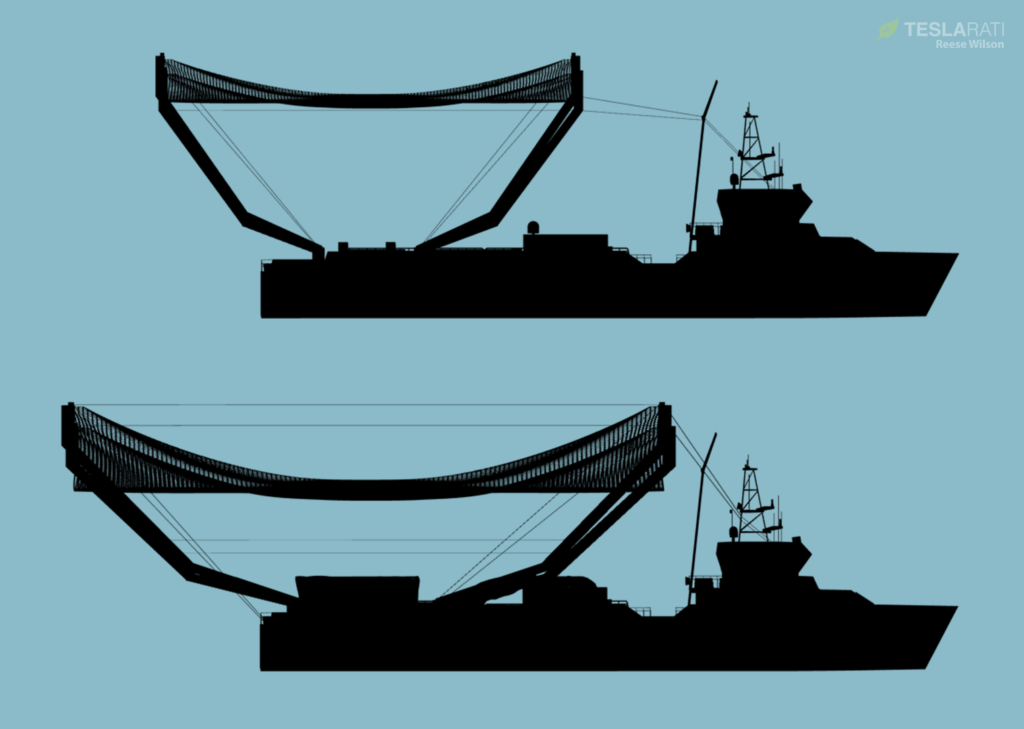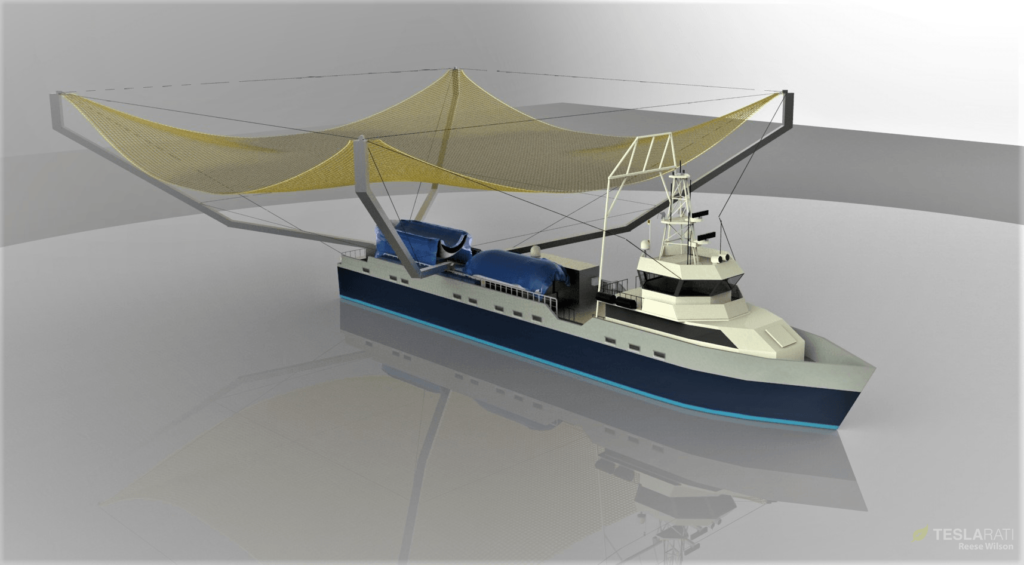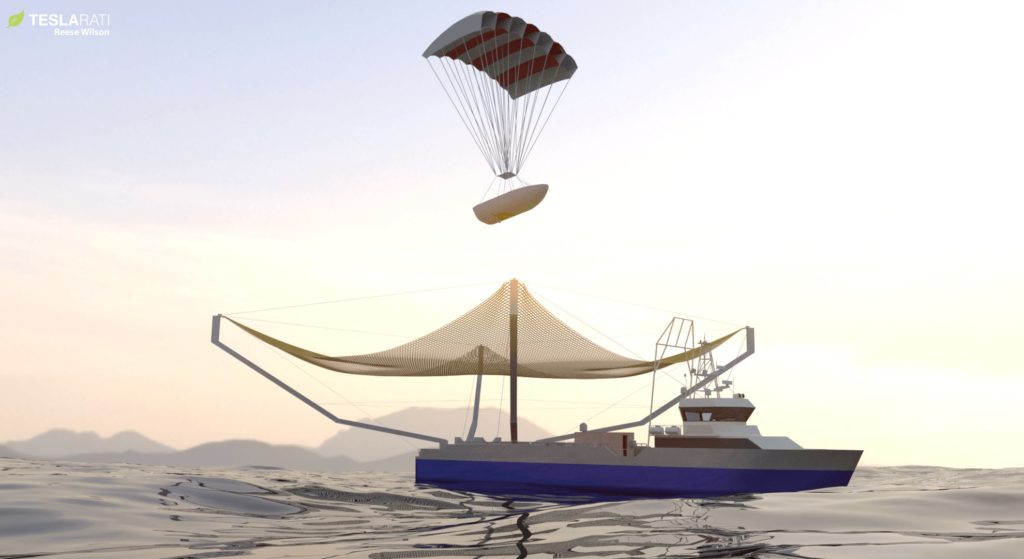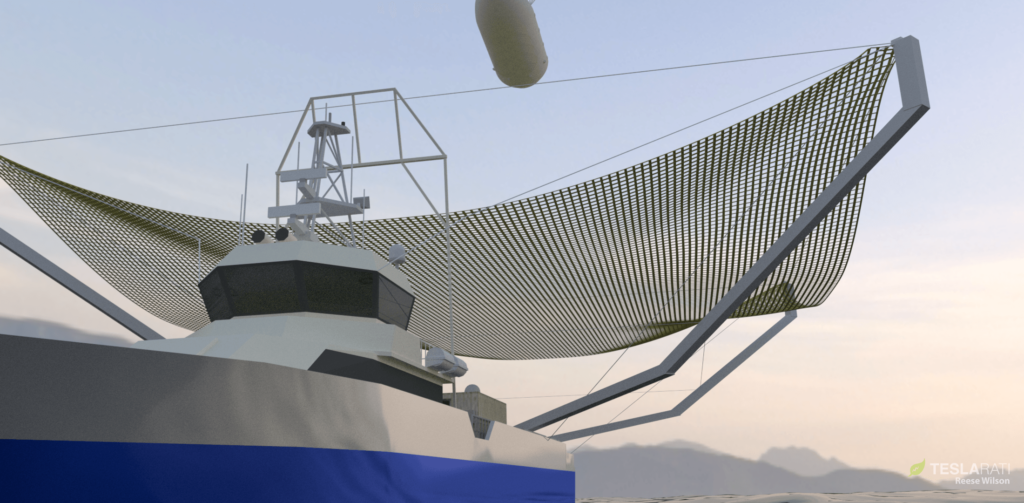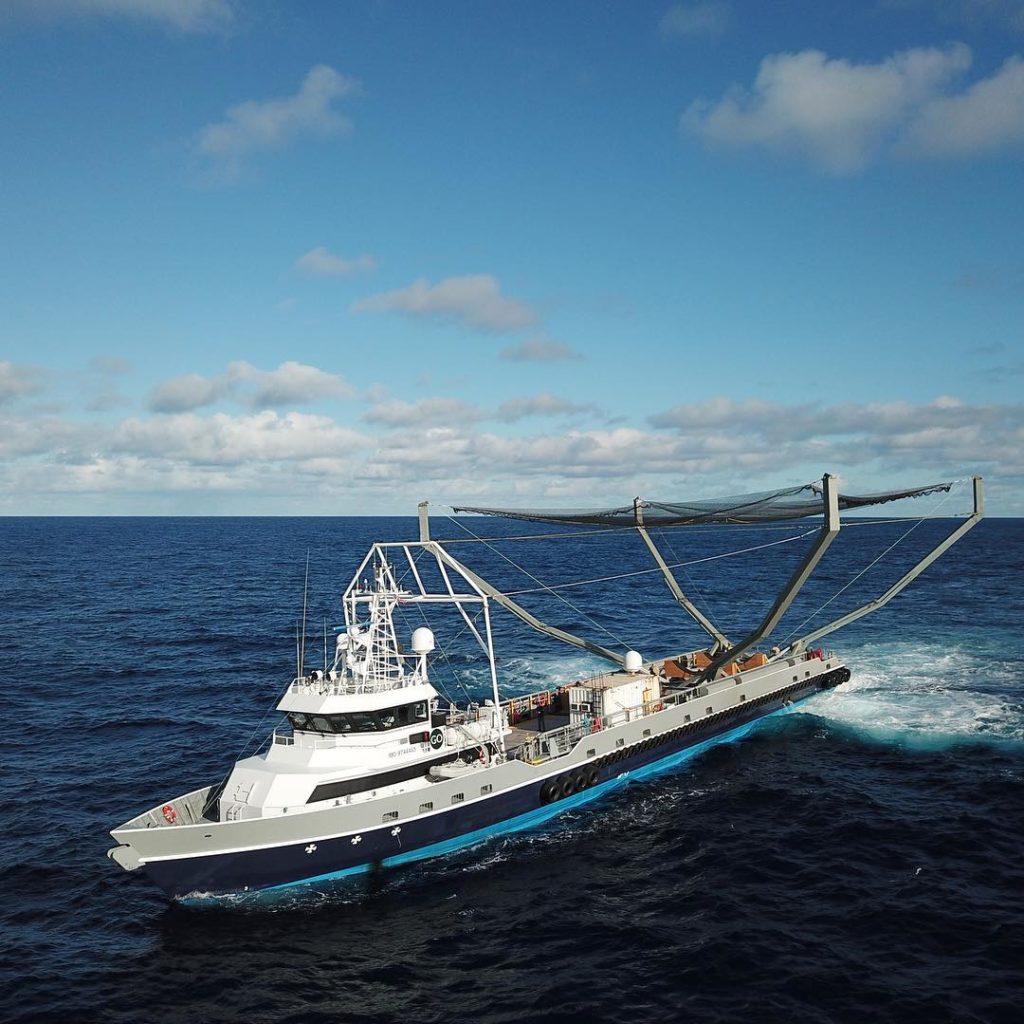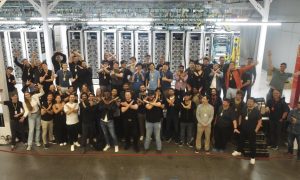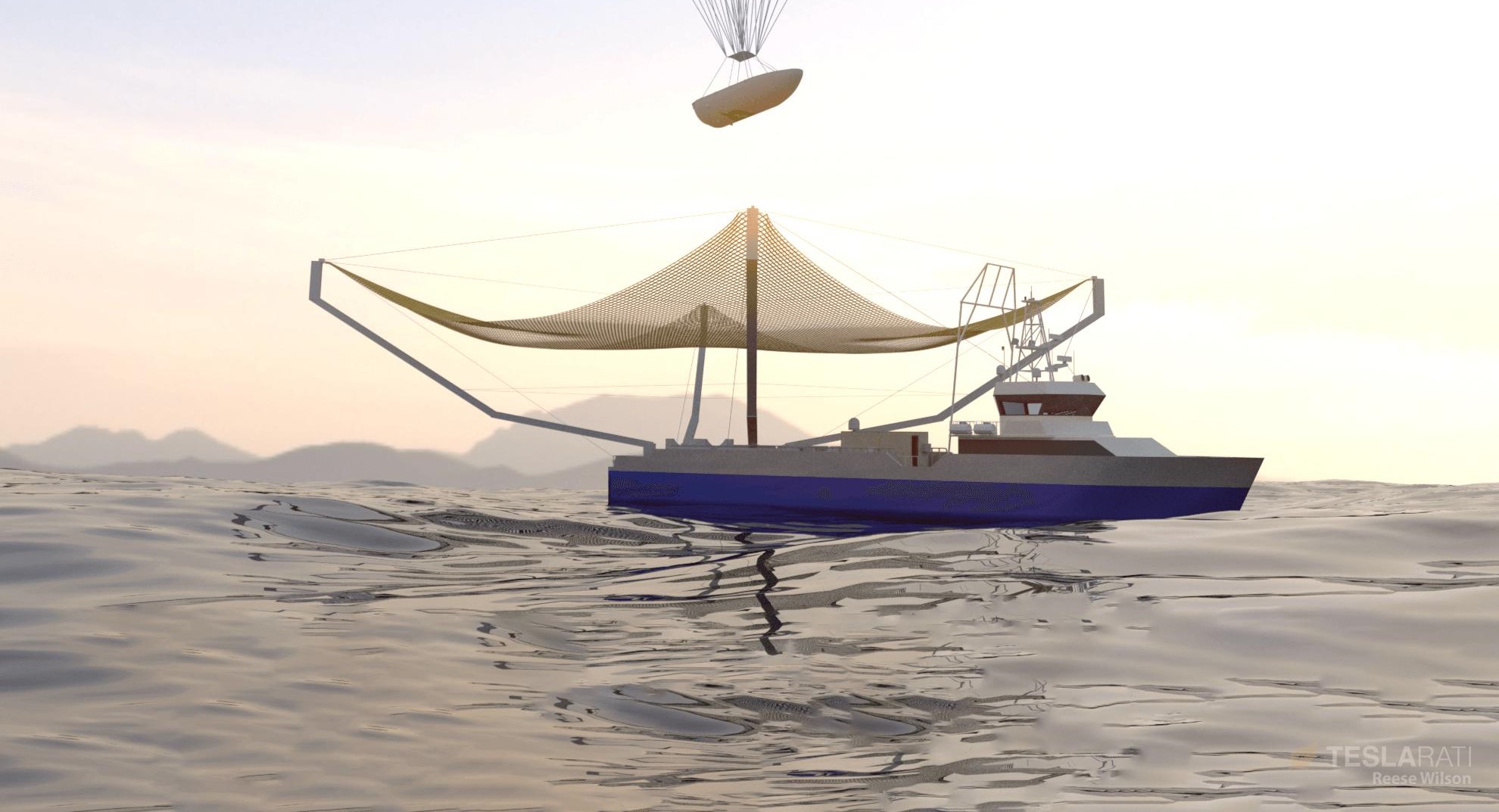

News
Renderings of SpaceX clawboat’s huge net upgrade is a taste of what’s to come
After several close-but-no-cigar attempts at snatching a Falcon 9 payload fairing out of the air, SpaceX’s iconic recovery vessel Mr Steven is currently laid up at the company’s newly-acquired Berth 240 dock space, roughly a week into the process of upgrading his arms to support a much larger net. CEO Elon Musk recently hinted that the boat’s net would be expanded by a factor of four, but what would such a dramatic growth look like?
To give a better idea of what to expect from Mr Steven’s arm and net upgrades, Teslarati’s Reese Wilson modeled and rendered the fairing recovery vessel with one such interpretation. The dimensions and aspect ratios may not be a mirror-image of the real-world Mr Steven, but the visual effect of the net upgrade is still fundamentally the same.
With respect to these renders, the actual net growth is somewhat less than the full fourfold area upgrade mentioned by Musk in early June – the concept art’s net is closer to 2.5 or 3 times larger than Mr Steven’s original net. This slight inaccuracy may actually be serendipitous, as a true 4X net could be downright unwieldy without the addition of some sort of complex retraction mechanism, versus the simple but functional (and infinitely reliable) implementation of fixed steel arms at the current net’s scale.
- A side-by-side comparison of Mr Steven before (top) and after (bottom) installation of a net with roughly 2.5X greater catching area. (Reese Wilson)
- Incredibly, this artist rendering of a much larger net installed on Mr Steven was perhaps two or more times smaller than the solution now installed on the vessel. (Reese Wilson)
Dramatic modifications nevertheless are all but guaranteed, as Mr Steven appears to have had the entire arm apparatus – including the steel base attaching them to his cargo deck – completely removed and placed on the side of the dock, still less permanent than the apparent decision to plasma or torch cut each arm off of that base, one of which is visible dockside at Berth 240. It may be possible to re-weld those severed arms onto the base, but it’s arguably more likely that entirely new arms, an entirely new base, or both will be fabricated, and those larger arms will themselves require a much larger net.
Ultimately, the fairing recovery vessel has gotten as close as 50 meters to gently catching a parasailing rocket fairing minutes after launch, an extraordinarily tiny error compared to the broader scope of the task at hand. Upon separation from Falcon 9’s upper stage, each payload fairing half is routinely traveling at speeds of 1.5 to 2 kilometers per second and reach apogees anywhere from 100 to 130 kilometers, all while traveling the better part of a thousand miles (800 mi/1300 km for Iridium-6) to reach Mr Steven’s net. As such, “missing” by 50 meters is an extraordinary achievement.
- A fairing floats gently into the welcoming embrace of Mr Steven’s upgrade net and arms. (Reese Wilson)
- With any luck, viewers may get a live view of the vessel’s next recovery attempts. (Reese Wilson)
- Mr Steven is currently undergoing arm surgery (upgrades) at SpaceX’s future BFR factory lot, known as Berth 240. (Elon Musk)
A fairing floats gently into the welcoming embrace of Mr Steven’s upgrade net and arms. (Reese Wilson)
With the vessel’s current net roughly 30 meters or 100 feet square (Mr Steven is 60m/200ft bow to stern), give or take 25%, a full fourfold upgrade would double each dimension, which could singlehandedly cut the error margin required for fairing recovery (currently 50 meters) by more than 50% if it remains square. If SpaceX finds a way to functionally achieve something close to a fourfold increase in area with a more rectangular aspect ratio (assuming that the fairing’s present error is more a matter of glideslope inaccuracy than properly pointing the half at Mr Steven), a rectangular net with a width ~50% and length ~300% larger – say 40 meters by 80 meters – would completely close the error gap between reliably missing and reliably catching Falcon fairings. To compare, a common football (soccer for our American readers) field is typically 70 meters by 100 meters.
Time will tell, and we’ll find out soon whether those arm and net upgrades can be available for SpaceX’s next California launch, currently scheduled on the morning of July 20th.

One half of SpaceX’s Iridium-6/GRACE-FO just moments before touchdown on the Pacific Ocean. (SpaceX)
Follow us for live updates, peeks behind the scenes, and photos from Teslarati’s East and West Coast photographers.
Teslarati – Instagram – Twitter
Tom Cross – Twitter
Pauline Acalin – Twitter
Eric Ralph – Twitter
News
The Tesla Diner is basically finished—here’s what it looks like
The company first broke ground on the Diner, Drive-in, and Supercharger location in September 2023. Now, it has served one of its first internal customers.

Tesla has finally completed the construction of its highly anticipated Diner, Drive-in, and Supercharger in Los Angeles, and recent photos of the interior’s “retro-futuristic” style are making their way around the internet.
X user Brad Goldberg shared photos from the Tesla Diner site last Tuesday, depicting some of the Supercharger stalls, indoor and outdoor seating areas, multiple neon lights, and even an Optimus robot. Goldberg also noted that there had been a “flurry of activity on site” while he was snapping the photos last week, suggesting that the restaurant location could be getting close to opening.
The Tesla Diner also served one of its first internal customers in the past few days, as Elon Musk posted on X on early Monday morning that he had just finished up eating a meal at the site:
I just had dinner at the retro-futuristic Tesla diner and Supercharger.
Team did great work making it one of the coolest spots in LA!
The photos also show that the site is pretty much done, with some of them even showing vehicles charging at the charging stalls.
You can see some of the latest photos of the Tesla Diner below.
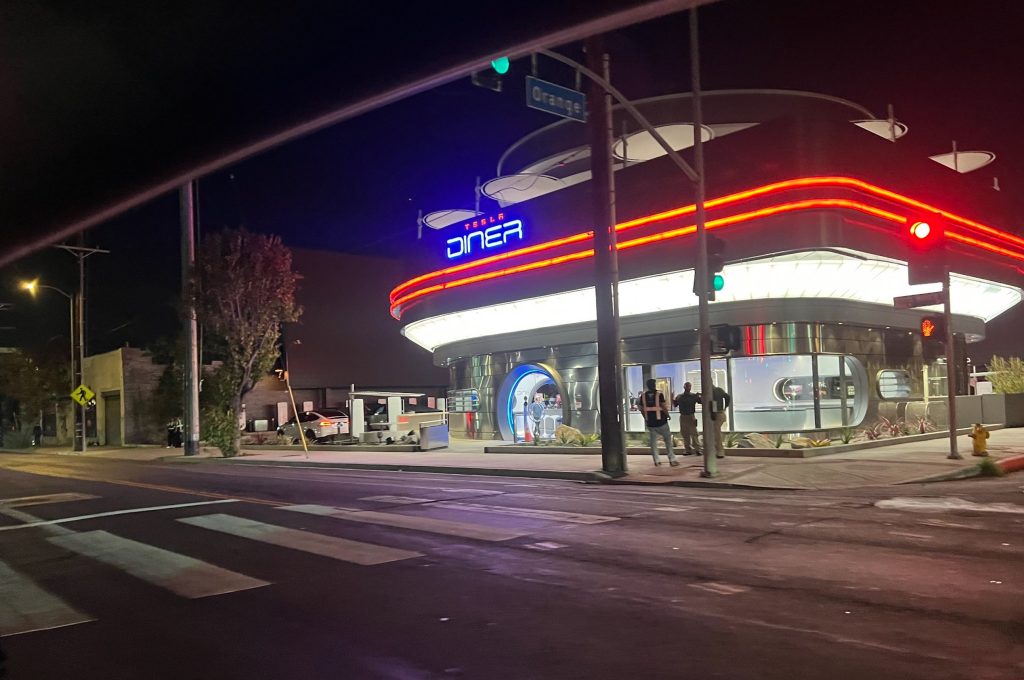
Credit: BradGoldbergMD | X
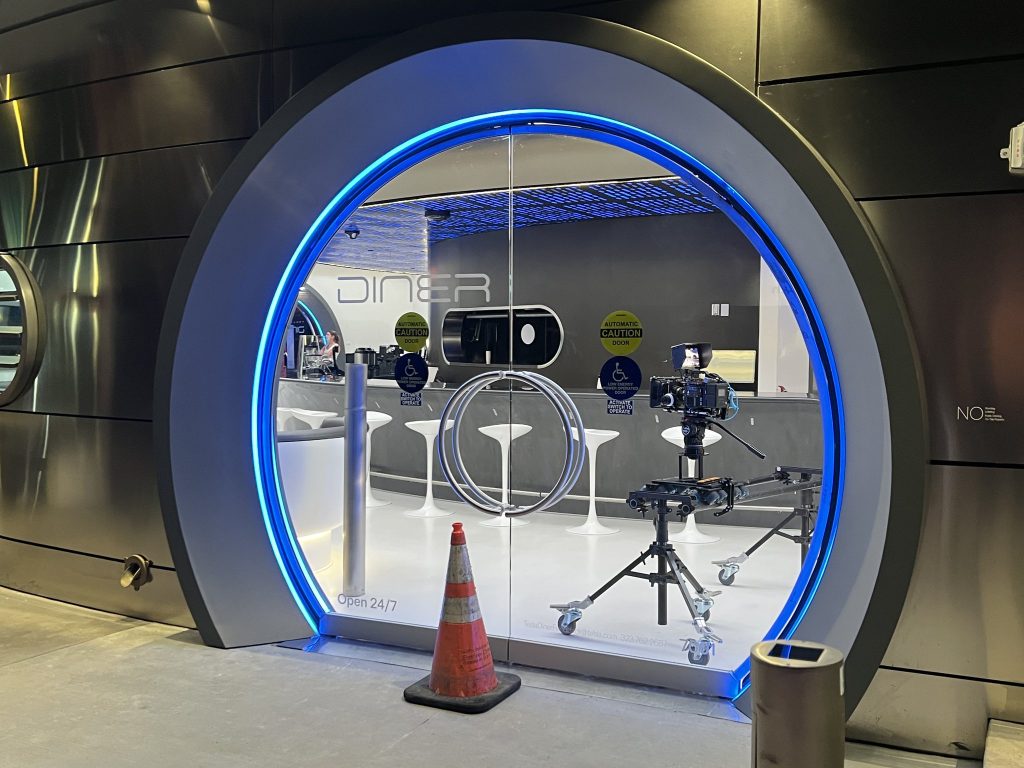
Credit: BradGoldbergMD | X
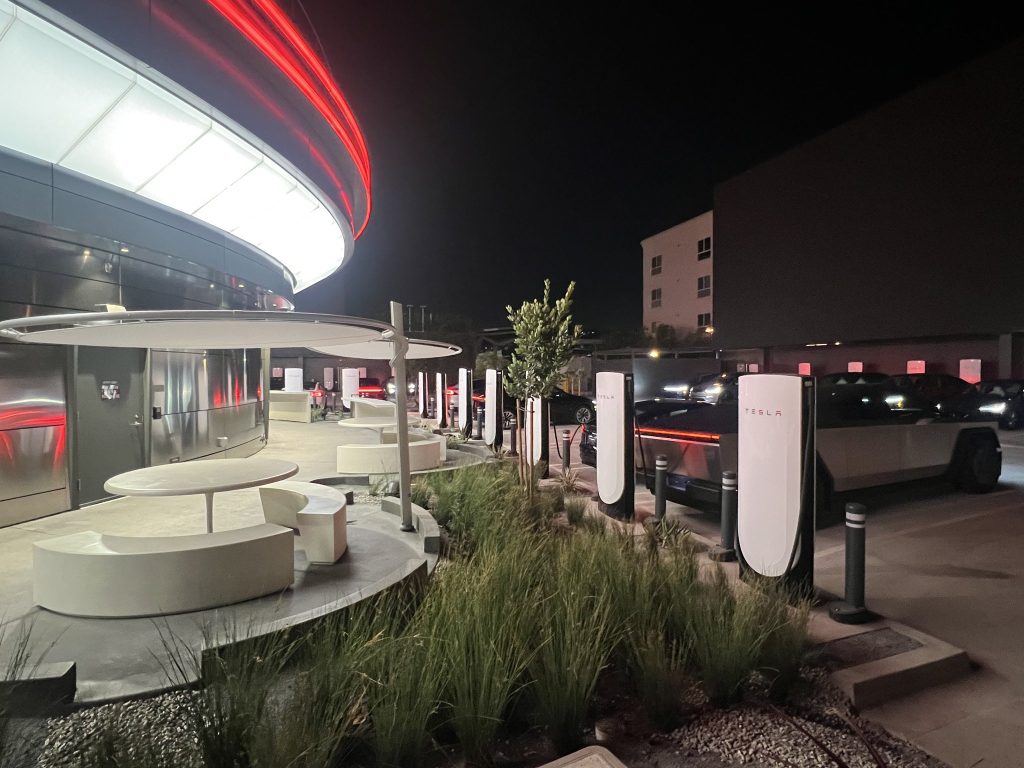
Credit: BradGoldbergMD | X
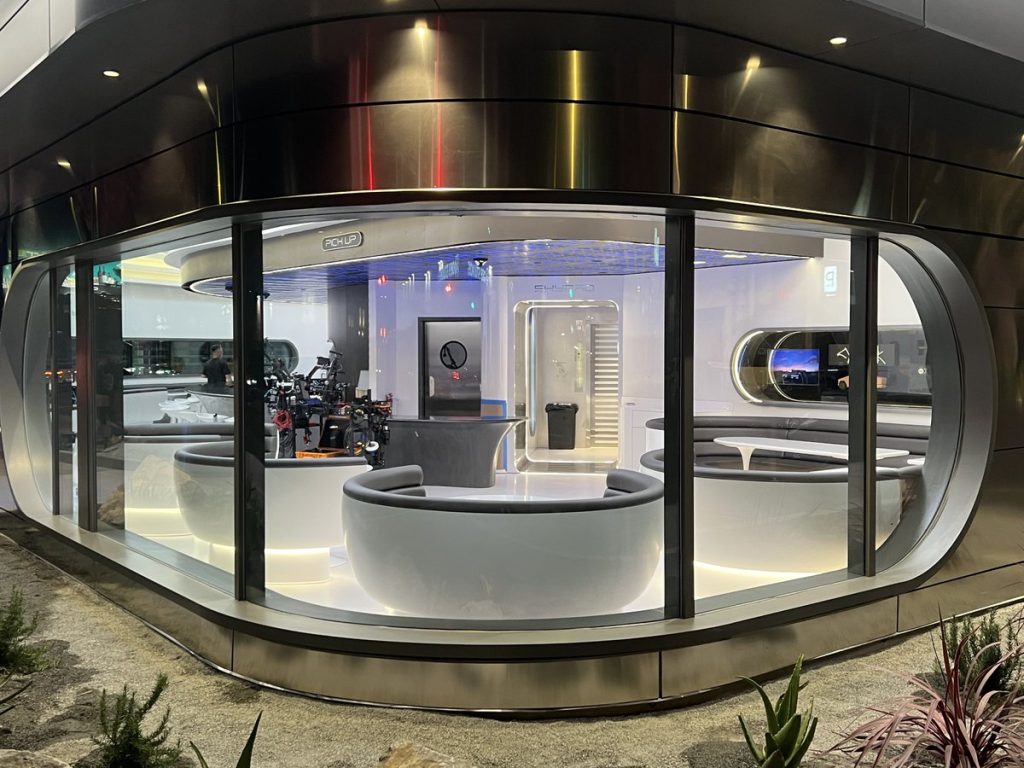
Credit: BradGoldbergMD | X
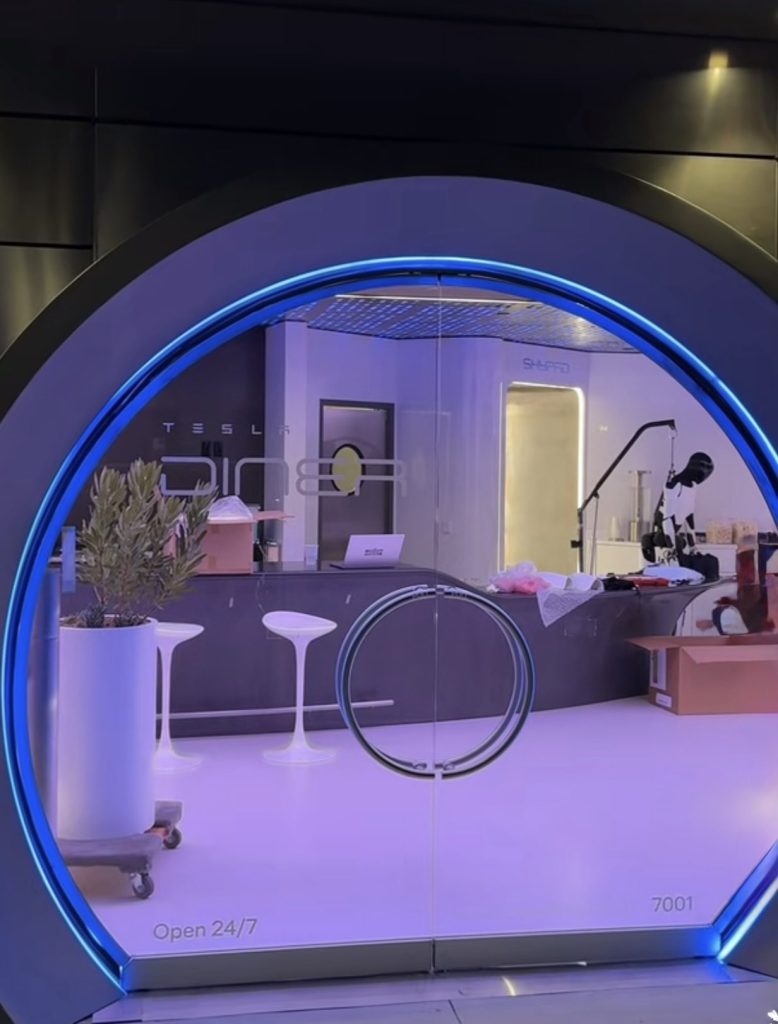
Credit: TeslaKing420 | X
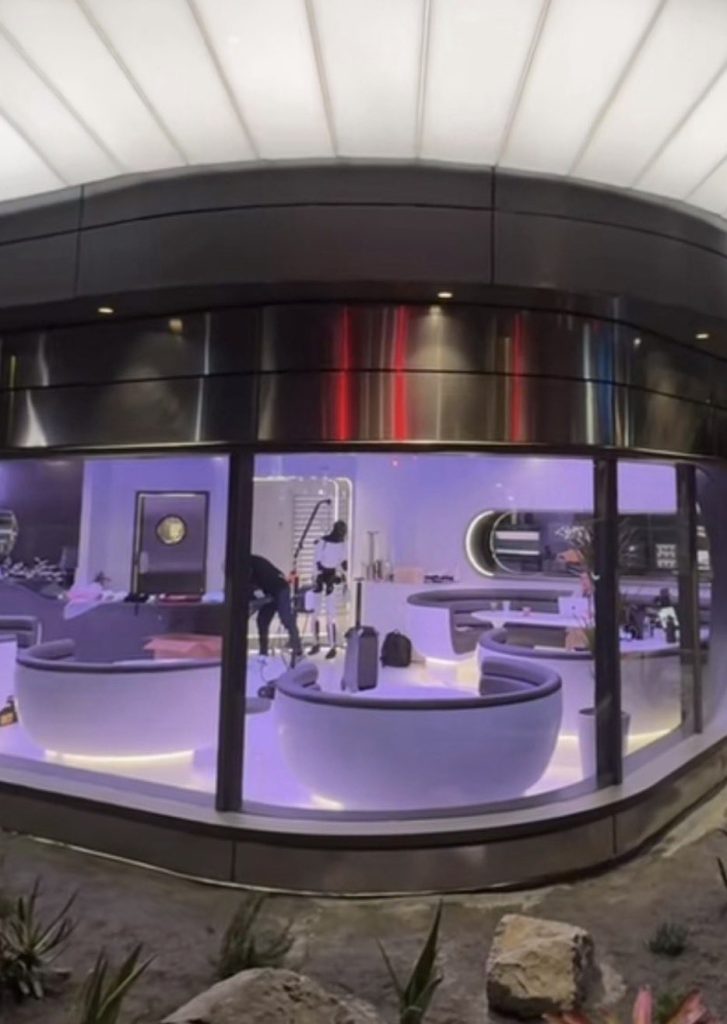
Credit: TeslaKing420 | X
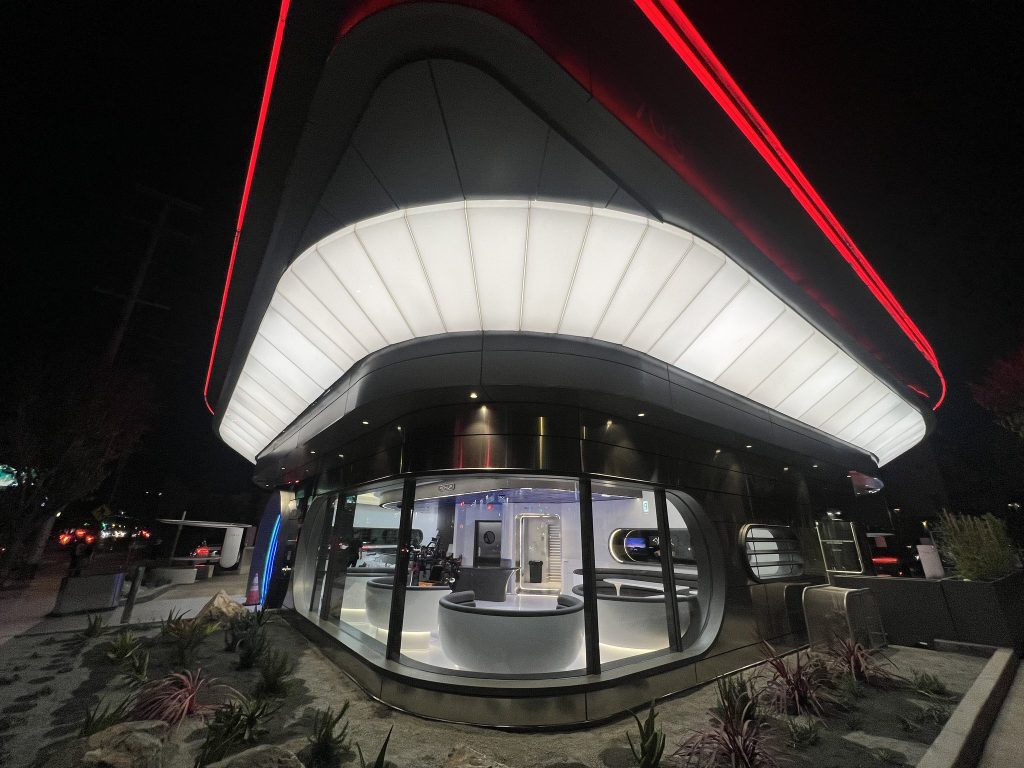
Credit: Brad Goldberg (via Sawyer Merritt on X)
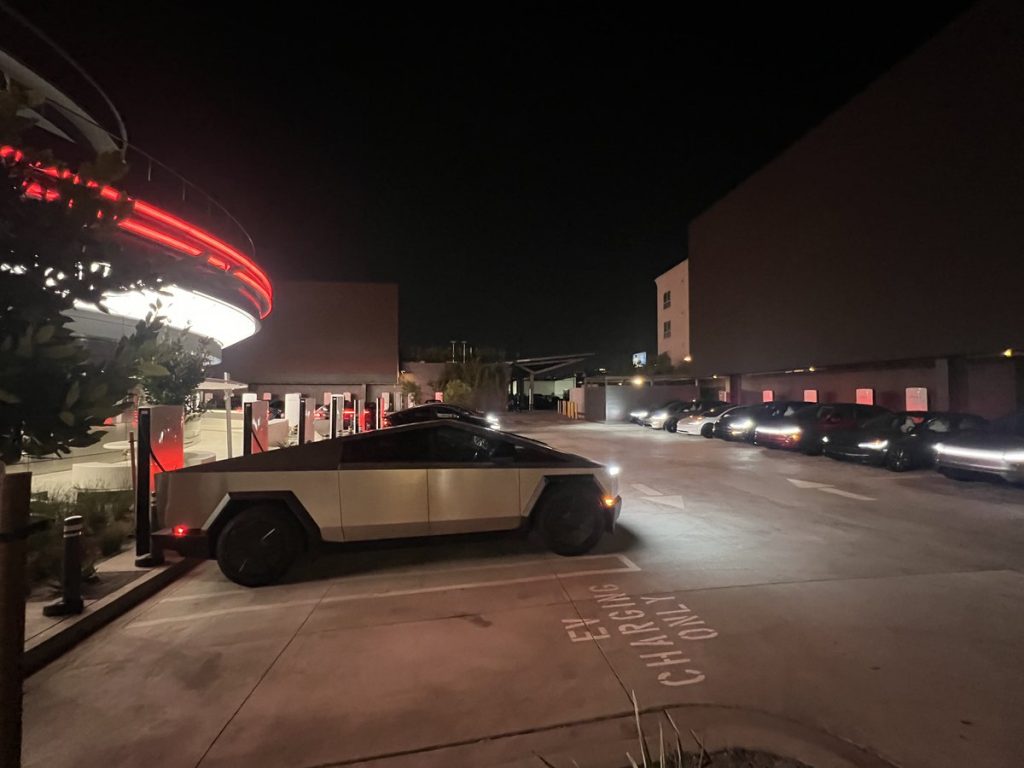
Credit: Brad Goldberg (via Sawyer Merritt on X)
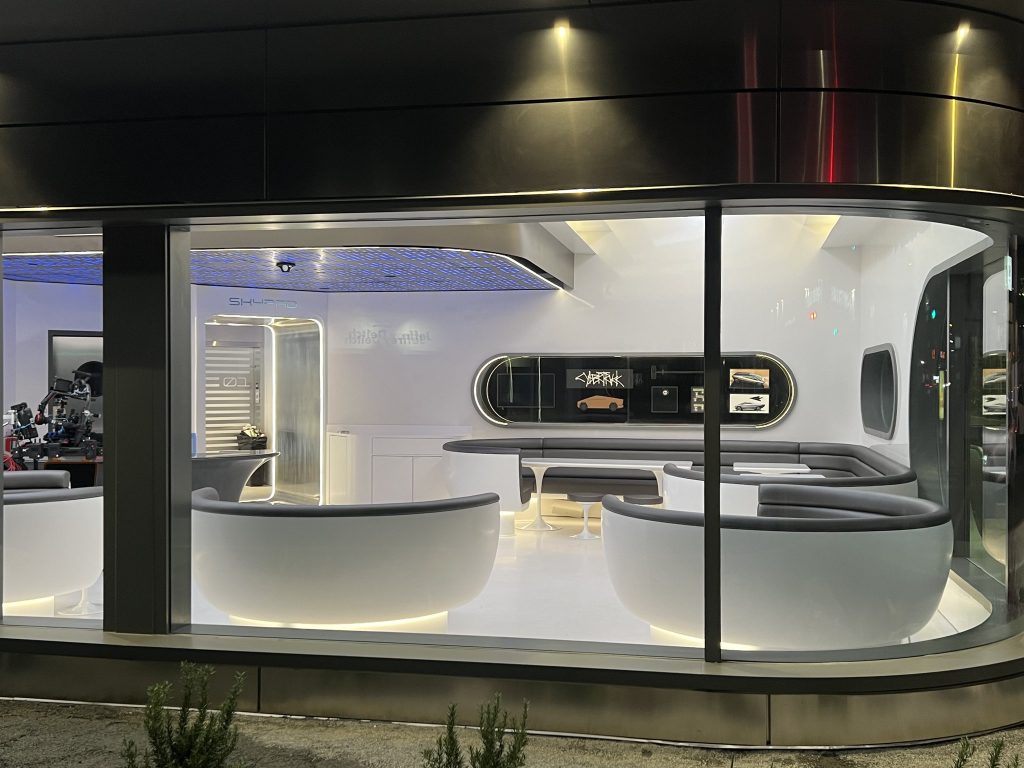
Credit: Brad Goldberg (via Sawyer Merritt on X)
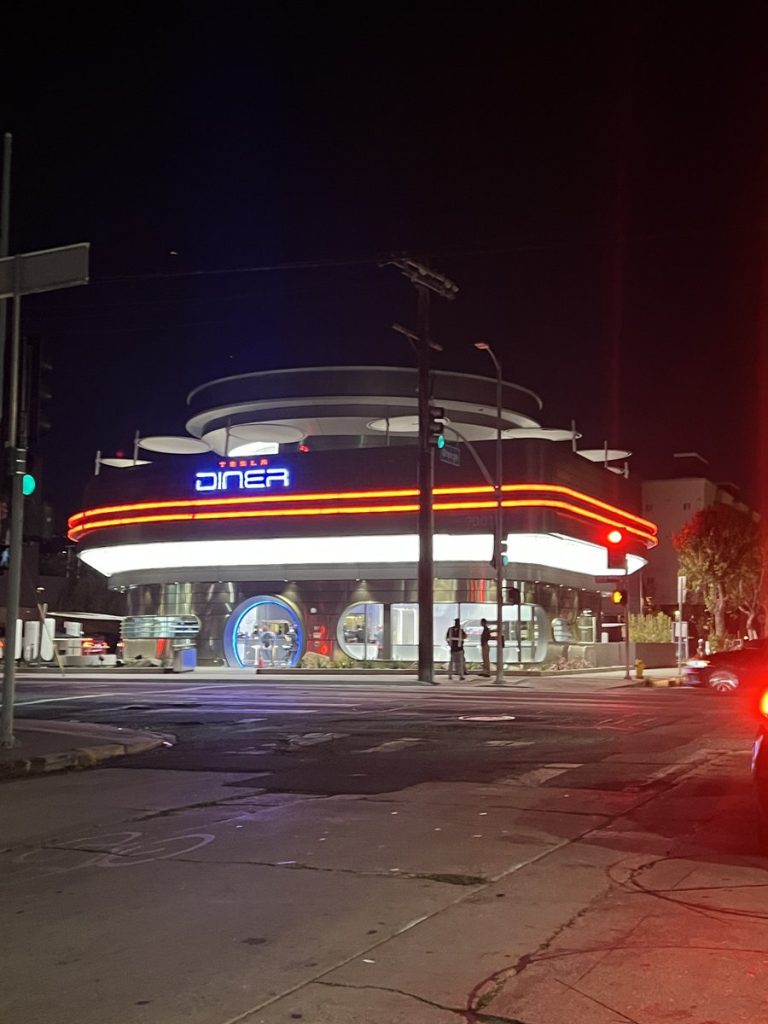
Credit: Brad Goldberg (via Sawyer Merritt on X)
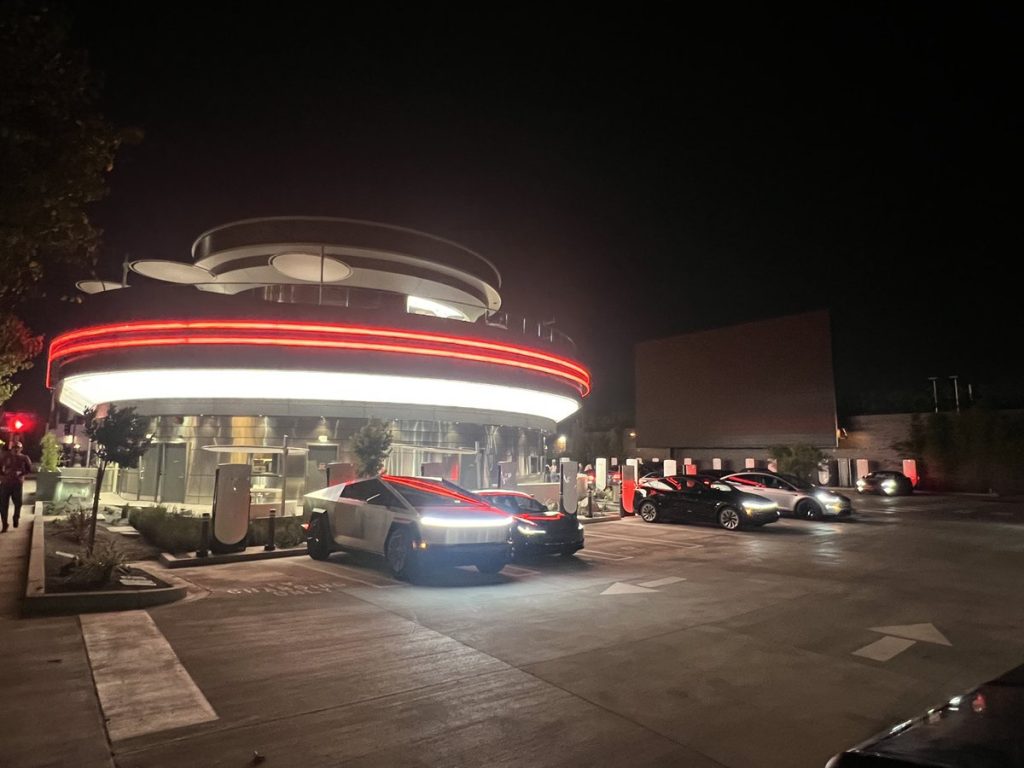
Credit: Brad Goldberg (via Sawyer Merritt on X)
READ MORE ON TESLA’S LA DINER: Tesla readies Drive-In Diner Supercharger for launch with app inclusion
When will the Tesla Diner open to external customers?
While it’s still not open to external customers yet, the news again suggests that the company could be close to an official opening date. Tesla first broke ground on the Diner in September 2023, after receiving a wave of building permit approvals throughout that year. Teslarati also covered much of the construction progress throughout last year, including when crews installed the first and second drive-in screens.
Located at 7001 West Santa Monica Boulevard, the idea was first discussed in 2018 by Musk and a few others on Twitter, featuring 1950s rock and roll, waiters on roller skates, and drive-in movie theater screens playing clips from some of history’s best movies. Notably, the photos of the front doors also show that the site will be open 24 hours a day, 7 days a week, whenever it does end up opening.
Tesla’s progress on Supercharger with diner, drive-in seen in aerial footage
Elon Musk
Tesla updates Robotaxi app with several big changes, including wider service area
Tesla’s Robotaxi app has gotten another update, and this time it offers a wider service area, but there are a lot of other changes, too.
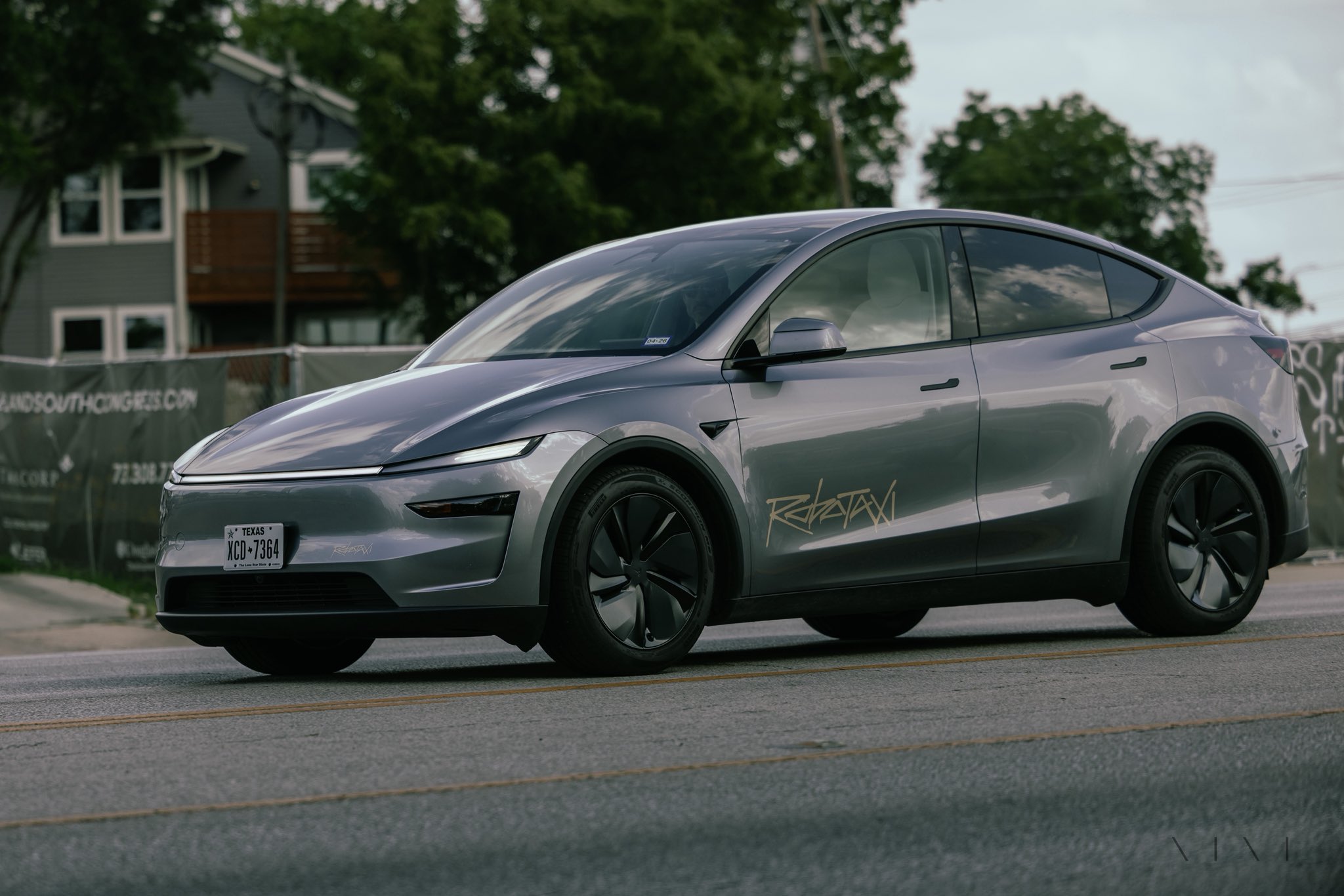
Tesla is rolling out its second update to its Robotaxi app after it launched the driverless ride-hailing service less than a month ago in Austin.
Among the changes, Tesla has expanded its service area, added walking directions to both the pickup and dropoff areas, added closing times for dropoff destinations, and allowed editing of your destination after booking a ride.
The new app version, Robotaxi 25.7.5, was rolled out on Monday morning. The biggest change is the near doubling of the service area, as Tesla expanded the possible travel region by a significant margin:
Tesla’s Robotaxi geofence in Austin grows, and its shape is hard to ignore
It’s no surprise Tesla decided to push the envelope with a new, interesting shape to the geofenced area that is hard to ignore.
The new region includes notable points of interest in Austin, most notably is the University of Texas at Austin. Tesla included the school, which has over 53,000 students, in this expansion, and it could be pushing the app and service to some of them in the coming weeks.
It’s a great addition as it is a highly concentrated area of the city, full of students and visitors.
Robotaxi app changes outside of new service area
Tesla has also added a handful of new changes. With its first update of the Robotaxi app, Tesla addressed several highly requested changes, including the ability to adjust the pickup location instead of being fixed to a default spot.
Walking Directions to Pickup and Destination
In congested and large metro areas, ride-sharing pickups are sometimes confusing to navigate to. When it comes to dropoff at your destination, exiting the vehicle at the front door is not always possible (many in Austin noticed this at Terry Black’s BBQ).
Tesla Robotaxi’s biggest challenge seems to be this one thing
Now, the app will guide you on how to reach your Robotaxi and your destination when pickup and dropoff are not available at the entrances of the establishments you’re visiting.
Search Results now show closing times
If you’re going to arrive at an establishment close to its closing time, the Robotaxi app will now warn you that you could arrive with only a few minutes to spare, or you could miss it altogether.
This is a nice touch because there’s nothing worse than craving some ice cream at 10 p.m., only to arrive and see the doors are locked and the lights are off.
Many navigation apps have this integrated to eliminate any confusion about closing times.
Destination editing after booking
This feature could go hand-in-hand with the closing times. As a business might close shortly after your arrival, you might find it advantageous to visit another establishment that has more time to serve you.
You can now pivot your destination after you have entered your Roobtaxi.
News
Tesla’s Robotaxi geofence in Austin grows, and its shape is hard to ignore
The expansion stayed true to Elon Musk’s rather lighthearted and juvenile humor at the same time.

Tesla has rolled out an expanded geofence for its Robotaxi pilot program in Austin, Texas. With the expansion, the Robotaxi’s geofence now rivals Waymo’s service area, while staying true to Elon Musk’s rather lighthearted and juvenile humor at the same time.
New Robotaxi geofence expansion
Elon Musk actually announced the expansion of the Robotaxi service’s Austin geofence last week, with the CEO stating that the company is expanding its coverage in the city over the weekend. At the time, Musk also mentioned that Tesla would be looking to launch its Robotaxi service in the Bay Area in a month or two.
Sure enough, there were no delays with the Austin Robotaxi expansion’s rollout. On Sunday, electric vehicle owners reported on social media that their Robotaxi apps have been updated with a much larger geofence. The rates of the Robotaxi service was reportedly still kept at a flat rate of $4.20 per ride.
Industry watchers also observed that with Tesla’s newest update, the Austin Robotaxi program now operates in an area that is quite comparable to Waymo’s. During the initial launch of Austin’s Robotaxi service, critics were keen to point out that Tesla’s operational area was notably smaller than Waymo’s geofence.
New shape pisses off critics, makes fans laugh
The fact that Tesla was able to expand its Robotaxi service’s operational area in Austin over the weekend is undoubtedly impressive. In true Elon Musk fashion, however, it also ended up pissing off critics because Tesla’s geofence in Austin is now shaped like a phallus—intentionally.
This was something that was suggested by TSLA retail investor Steve Mark Ryan as a joke, but in true Tesla spirit, the company did just that. It’s a classic Tesla move if one were to think about it.
Elon Musk and the Tesla team are keen to play around the joke too, with Musk posting on X that the Robotaxi service is now “bigger, longer, and uncut.” The official Robotaxi service’s X account, on the other hand, also wrote that its new service area is “harder, better, faster, stronger.”
-

 Elon Musk2 weeks ago
Elon Musk2 weeks agoTesla investors will be shocked by Jim Cramer’s latest assessment
-

 News2 days ago
News2 days agoTesla debuts hands-free Grok AI with update 2025.26: What you need to know
-

 Elon Musk4 days ago
Elon Musk4 days agoxAI launches Grok 4 with new $300/month SuperGrok Heavy subscription
-

 Elon Musk6 days ago
Elon Musk6 days agoElon Musk confirms Grok 4 launch on July 9 with livestream event
-

 News1 week ago
News1 week agoTesla Model 3 ranks as the safest new car in Europe for 2025, per Euro NCAP tests
-

 Elon Musk2 weeks ago
Elon Musk2 weeks agoxAI’s Memphis data center receives air permit despite community criticism
-

 News4 days ago
News4 days agoTesla begins Robotaxi certification push in Arizona: report
-

 News2 weeks ago
News2 weeks agoTesla sees explosive sales growth in UK, Spain, and Netherlands in June


